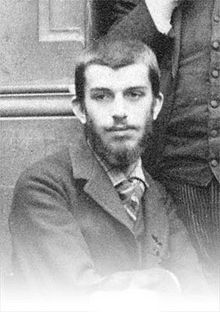Élie Halévy
French philosopher and historian (1870-1937)
Élie Halévy (6 September 1870 – 21 August 1937) was a French philosopher and historian who wrote studies of the British utilitarians, the book of essays Era of Tyrannies, and a history of Britain from 1815 to 1914 that influenced British historiography.

Quotes
edit- Charity towards mankind as a whole, Hope in the future welfare of the human race, Faith in the possibility of furthering, through co-operation between nations, the cause of knowledge and culture, of everything that the eighteenth century, the most Anglo-French century in history, called by a fine name, "enlightenment"—Les Lumières. It is in this philosophical spirit that I mean to approach my difficult subject.
- The World Crisis of 1914–1918: An Interpretation (1930), p. 4
- Modern socialism is a doctrine with a double aspect... It is a doctrine of emancipation...and it is a doctrine of organisation.
- The Era of Tyrannies (1938; trans. edn. 1967), p. 80
- The Labour leaders are men whose doctrine requires them to make the state stronger, and whose good British instinct is to make the state as weak as possible.
- The Era of Tyrannies (1938; trans. edn. 1967), p. 198
- I can still hear Sidney Webb explaining to me that the future lay with the great administrative nations, where governing was done by the bureaucrats and order was maintained by the policemen.
- The Era of Tyrannies (1938; trans. edn. 1967), p. 209
Quotes about Élie Halévy
edit- M. Brunschvicg has said of L'Angleterre en 1815 that it is not only a model of what an exhaustive study of a civilization should be: it is also a masterpiece of psychological insight. The praise is just. It is no wonder that English scholars, and the English public in general, have come to recognize Halévy as the great interpreter of nineteenth-century England.
- Ernest Barker, 'Élie Halévy', The English Historical Review, Vol. 53, No. 209 (January 1938), p. 84
- James Mill and Jeremy Bentham lived for him: Canning and Peel were his companions: the Wesleyans were not abstractions, but human flesh and blood. Above all, he had a justice and a balance in his views, and a clarity in his expression, which made him a master of exposition. Perhaps he had not eloquence, though he could lecture as few men can: perhaps he had not the gift of style, though he could say exactly, and with a rigorous economy of words, just what he wished to say. Such things would have been incompatible with the severe simplicity which was his essence. He had no artifices: he laboured simply to understand, and to set down simply his understanding. His book on the formation of philosophic radicalism, and the first volume of his history, are standing witnesses, and they are likely to be enduring witnesses, that he succeeded in his endeavour. His interpretation of English thought and English life, through all the long years from the youth of Bentham to the end of the World War, is one of the greatest gifts which the genius of France could have made to England, and it is a gift which English scholars will not forget.
- Ernest Barker, 'Élie Halévy', The English Historical Review, Vol. 53, No. 209 (January 1938), p. 87
- The first volume, England in 1815, a comprehensive and concise panoramic study, is widely regarded as Halévy's masterpiece. The book is unique in both conception and execution. I do not know of any other historical work which arrests the stream of history at a particular moment in time, in order to portray the whole condition of a society at one critical juncture. Nor does any other work come to mind which, to put it a little flatly perhaps, includes so much information in so manageable a compass... Whatever scholars may eventually decide about his interpretation, the descriptive aspects of the volume are not likely to be superseded.
- Charles Coulston Gillispie, 'The Work of Élie Halévy: A Critical Appreciation', The Journal of Modern History, Vol. 22, No. 3 (September 1950), p. 238
- Halévy's account of foreign policy, however, is, in my opinion, the weakest aspect of his History... [I]t remains true that Halévy's innate distaste for power politics growing out of his general dislike for the factor of force in public affairs did prevent him from treating diplomacy with the sympathetic penetration that characterized his discussion of internal problems.
- Charles Coulston Gillispie, 'The Work of Élie Halévy: A Critical Appreciation', The Journal of Modern History, Vol. 22, No. 3 (September 1950), pp. 241-242
- Professor E. Halévy is best known in England for his Historie du peuple anglais au XIXe siècle, the first volume of which appeared in 1913. English critics generally agreed that it ranked among the best histories of the period.
- 'Professor E. Halévy', The Times (25 August 1937), p. 14